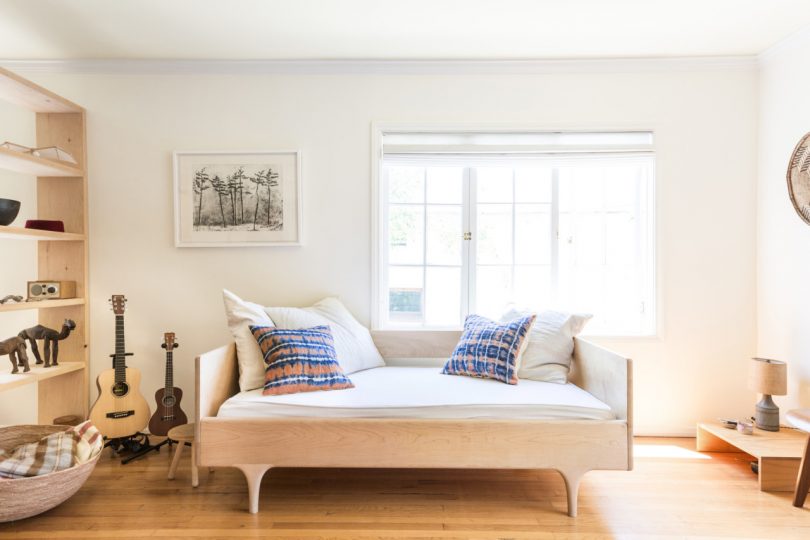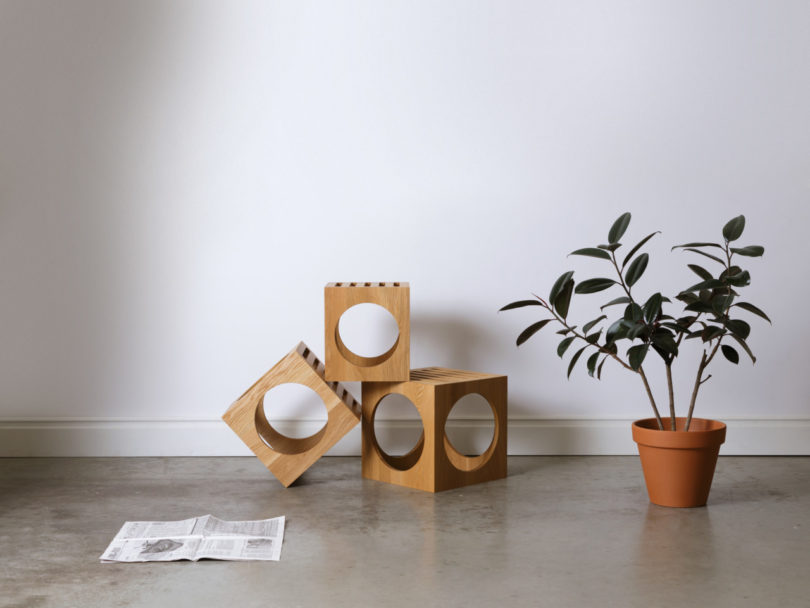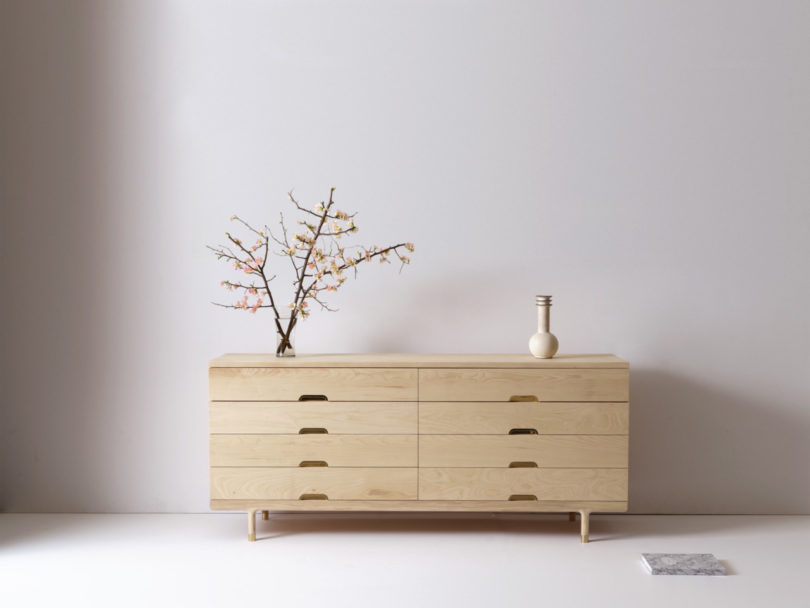Choosing to invest in furniture for your home is just that, an investment. There’s time and money that goes into curating and creating a space that you look forward to coming home to. What may not be at the forefront of your decision-making is that when you’re buying furniture, you’re not only investing in your own home, you’re investing in the studios that design these beautiful pieces. You’re investing in the people who make your pieces by hand, in turn so that they can make livable wages. You’re investing in the future of the craftsmanship, ensuring that it doesn’t get replaced by mass-produced, machine-made processes. You’re also investing in the future of the planet by choosing quality products that don’t need to be replaced often only to end up in our landfills.
These are all important values for Michaele Simmering and Johannes Pauwen who founded Kalon Studios, a brand based in Los Angeles known for its pared-back, timeless designs made from traditional + modern craftsmanship and natural materials. We wanted to know more about their studio’s sustainability and manufacturing practices so we caught up with Michaele to learn more about why she believes slow design matters.
What was the impetus for you to create Kalon Studios?
I was pregnant and in grad school. Johann and I had been talking about doing something on our own for years and it felt like a now or never moment.
Where did you get the name for the studio?
Kalon is an ancient concept of ideal beauty. When an object is Kalon, it’s beautiful because there is an inherent goodness that radiates from each detail. Like everything we do, we were extremely thoughtful about the name.
How would you describe your furniture line? What makes each piece so special?
Pared-back. Functional. Timeless. Or at least we hope so. We’re extremely interested in tools as objects of beauty. The daily objects that surround us change the way we relate to a space. They can elevate us. We focus on that ability. We don’t want our work to be overly precious. We want the designs to be pieces that people can truly live with. Pieces that people will love for years. Choosing natural materials is a part of that. There is an inherent warmth to the materials and an ability to age with grace.
The value you place on age-old woodworking skills and craftsmanship is quite apparent in your timeless designs. What made you want to return to this slower, simpler way of furniture design? In other words, what do you think makes this type of craftsmanship so exceptional?
Our pieces are built using a mix of cutting-edge technologies and time-tested methods. So we aren’t married to old ways of doing things, it’s more of an approach where there is a pride in craft. We don’t want to compromise the quality of our designs to make them more convenient to produce. The number one issue the woodworking industry faces is access to craftspeople with the skill to build a finished piece. A true craftsman works like an artist. They understand the idiosyncrasies of the material. They understand that the craft is in the details. We recently did a string of interviews with our craftspeople and every last one of them mentioned that the most satisfying part of what they do is seeing the finished piece come together with an understanding of how the execution of smallest detail is critical to the finished piece. There is a deep pride in the work and an appreciation of detail that we share.
Why is sustainability and local manufacturing such an important element in the craftsmanship of your designs?
We live in a crazy time. It has a very end of days feeling to it. I honestly don’t see how any thoughtful person can be detached from sustainability. For me, sustainability is a core criteria for good design. We don’t want our work to deplete resources. Whatever our individual beliefs, we humans share a common destiny and what each of us does impacts all of us. We strive to have our impact be as positive and mutually sustainable as possible.
There has been an on-going movement where people are becoming more aware/ considerate of the items they buy, what they’re made from, and how they’re being made. For those who don’t consider these factors (or sometimes waver in making the investment in well-designed objects), what would you say to them to convince them otherwise?
We’re not really coming at our work with convincing people in mind. We do the sustainable work for ourselves because we want to feel proud of what we’re making. We are building our ideal pieces. Sustainability alone can’t be what sells the work. For our work to succeed, it has to appeal to different kinds of people and for different reasons.
Look, I understand that making political or ideological choices about how we spend our money is a luxury. It’s not something all of us can afford to do. So let’s split your question into two parts.
On the ethical, sustainable side of it, I think it’s helpful for all of us to remember that the objects we live with were made by people, meaning real human hands somewhere in the world. Particular choices were made throughout the production process. We can ask if the materials were responsibly sourced? Were the processes fair for the people who made them? Were they harmful? Are the materials and finishes healthy for us to live with? Were ethics part of the conversation or were profit margins the bottom line? And we can ask ourselves if any of this matters to us. Do we care if someone or some place was harmed in the process? And we can ask ourselves if we have the luxury of making these questions. We are each responsible for determining that for ourselves. People have become extremely savvy about what they’re looking for with food and beauty products. They want more transparency. They aren’t willing to put just anything in or on their body. They understand the disastrous effects of mono-cropping and fast fashion on the environment and humans. All of this understanding can be applied to hard goods. We can treat a sofa the same way we treat an egg. We can ask the same kind of questions about where the piece came from and what’s inside it.
The quality side is simpler to address. Let’s call what we’re doing at Kalon ‘slow design’. A slow designed good doesn’t just take all of the above into consideration, it also considers where the product goes after production, how it will age, how it will be lived with. These objects are designed to age gracefully, to wear in, not out. By default this means a higher-quality object. One that can last a life-time. This is not a piece that will break down or look terrible after a year of use. The piece likely costs more than the alternatives but you’re likely to be replacing it multiple times if you choose the lesser made piece.
Since founding Kalon Studios back in 2007, are there any milestones or moments that particularly stand out to you in those past eleven years?
So many. We started as a bunch of art school kids making stuff in a driveway. Kalon was a dream we were chasing. The first several years were a total blur, working 20 hour days with babies on our laps, falling asleep on our computers, running around the country doing our best to sweet talk shops into taking a chance on our work. We couldn’t keep up with the orders. We couldn’t keep up with the company. We were so busy we completely missed the moment when Kalon became an actual company.
What advice would you give to your younger self or someone who wants to follow a similar path?
Love what you do. Do what you love. If you don’t, the struggles will be insurmountable. Also, perseverance above all else. You get kicked in the teeth 10 times a day and it doesn’t get easier.
What’s next for you and Kalon Studios?
Look for smaller pieces and outdoor. We have so much we’re always working on but those are the pieces I’m the most excited about right now.
Let’s do some rapid fire questions. One book you’ll always recommend?
Bluets by Maggie Nelson
Favorite moment of your day?
When I get into a bath by myself.
One thing that’s currently inspiring you?
The new batch of freshmen women in congress.
One word to describe your state of mind for 2019?
Optimistic.
To learn more about Kalon Studios and their “design for a sustainable culture,” visit kalonstudios.com.
from WordPress https://connorrenwickblog.wordpress.com/2019/04/08/kalon-studios-on-why-slow-design-matters/


















No comments:
Post a Comment